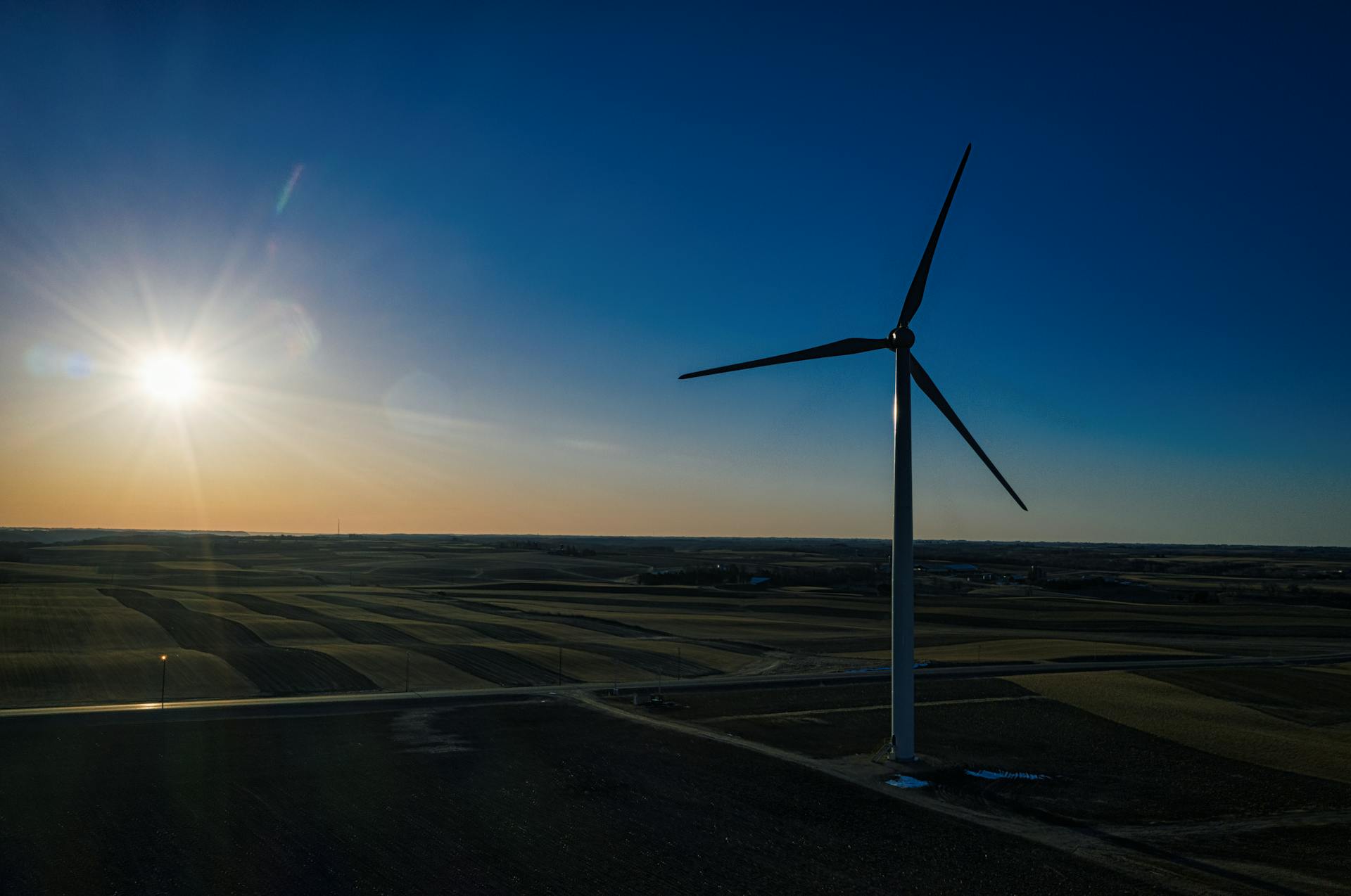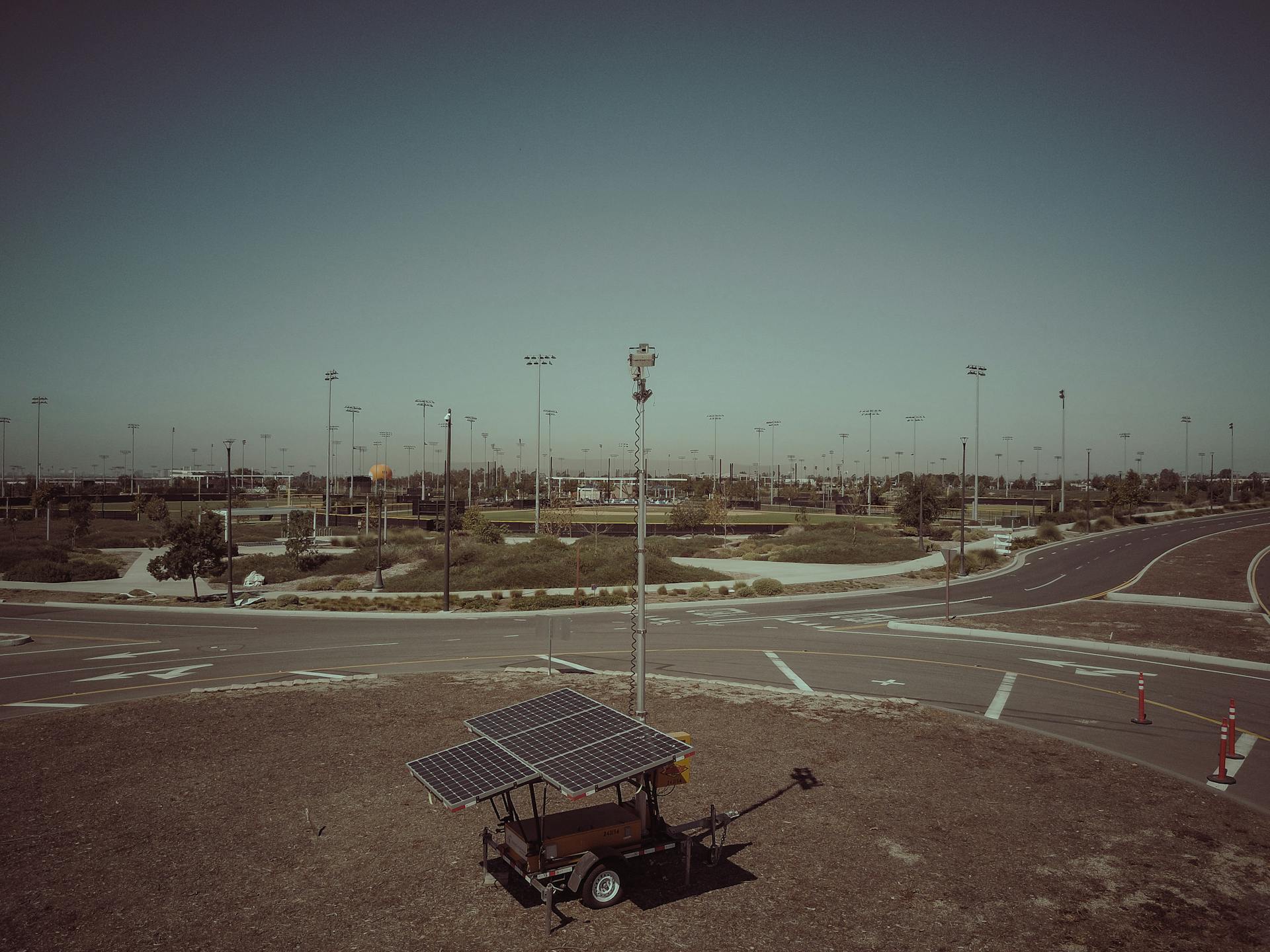
Inverter generators are a type of generator that converts DC power into AC power, making them ideal for sensitive electronics.
They produce clean energy with a sine wave output, which is essential for devices like laptops, smartphones, and televisions.
Inverter generators are also quieter and more fuel-efficient than traditional generators, making them a popular choice for camping and outdoor activities.
One of the main benefits of inverter generators is their ability to provide a stable power supply, which is perfect for powering essential appliances during a power outage.
What Is an Inverter Generator?
An inverter generator is a type of portable generator that uses an electronic alternator to produce electricity.
It's designed to generate clean, stable power.
Inverter generators use advanced technology to convert AC power generated by the engine into direct current (DC) power, and then back into clean, stable AC power.
They can be used for various household appliances or tools, making them a convenient option for camping trips or powering small workshops.
Inverter generators are designed to make the most efficient use of fuel and minimize emissions.
Benefits and Advantages
An inverter generator is a game-changer for anyone who needs a reliable power source, whether at home or on the go. One of the biggest advantages of an inverter generator is its fuel efficiency. Inverters adjust their engine speed to match the power demand, leading to greater fuel efficiency.
This means you can typically run the generator for longer on the same amount of fuel, saving you money in the long run. Inverter generators are also quieter than traditional generators, ideal for residential and off-grid use.
Their compact and lightweight design makes them more portable and easy to store for outdoor activities. You can also connect multiple inverter generators in parallel for increased power, making them perfect for camping trips or emergency backup power.
Inverter generators deliver cleaner power, suitable for sensitive electronic equipment and medical devices. They produce fewer emissions, promoting a healthier environment. The AC power produced by an inverter generator is very low in harmonic distortion, making it safe to use with small electronic devices.
Here are some key benefits of inverter generators at a glance:
- Quieter operation
- Enhanced fuel efficiency
- Compact and lightweight design
- Parallel compatibility
- Cleaner power
- Fewer emissions
Overall, inverter generators offer a range of benefits that make them an attractive option for anyone who needs a reliable power source.
Pros and Cons
Inverter generators have their advantages and disadvantages, which are worth considering before making a purchase.
Inverter generators are generally quieter than traditional portable generators, producing less noise pollution and making them ideal for camping, tailgating, and other non-emergency uses.
They are also more efficient, using less fuel and reducing their environmental impact. This is a significant advantage, especially for those who plan to use their generator frequently.
Inverter generators deliver cleaner power, which is essential for sensitive electronic equipment and medical devices. This makes them a great option for people who need reliable power for these types of devices.
However, the main drawback of inverter generators is their higher cost. They can be significantly more expensive than traditional portable generators with comparable wattage.
Here are some key differences between inverter and traditional generators:
Overall, inverter generators offer several benefits, but their higher cost is a significant drawback.
Pros and Cons
Inverter generators have some amazing benefits, but they also have some downsides. Let's take a closer look at the pros and cons.
One of the biggest advantages of inverter generators is that they're quieter than traditional portable generators. They're also more efficient, using less fuel, which can save you money in the long run.
Inverter generators deliver cleaner power, making them perfect for sensitive electronic equipment or medical devices. This is especially important if you're planning to use your generator for camping, tailgating, or other non-emergency uses.
However, the main drawback of inverter generators is the cost. They can be significantly more expensive than traditional portable generators with comparable claimed wattage. For example, a top-rated large inverter generator can cost as much as $4,600, while a similar-sized conventional generator can be purchased for as little as $850.
Here's a comparison of the pros and cons of inverter generators in 5 key aspects:
Another drawback of inverter generators is that many units achieve their compact size by burying important components, like the carburetor, inside the unit, making servicing the generator harder for a homeowner.
Noise Level
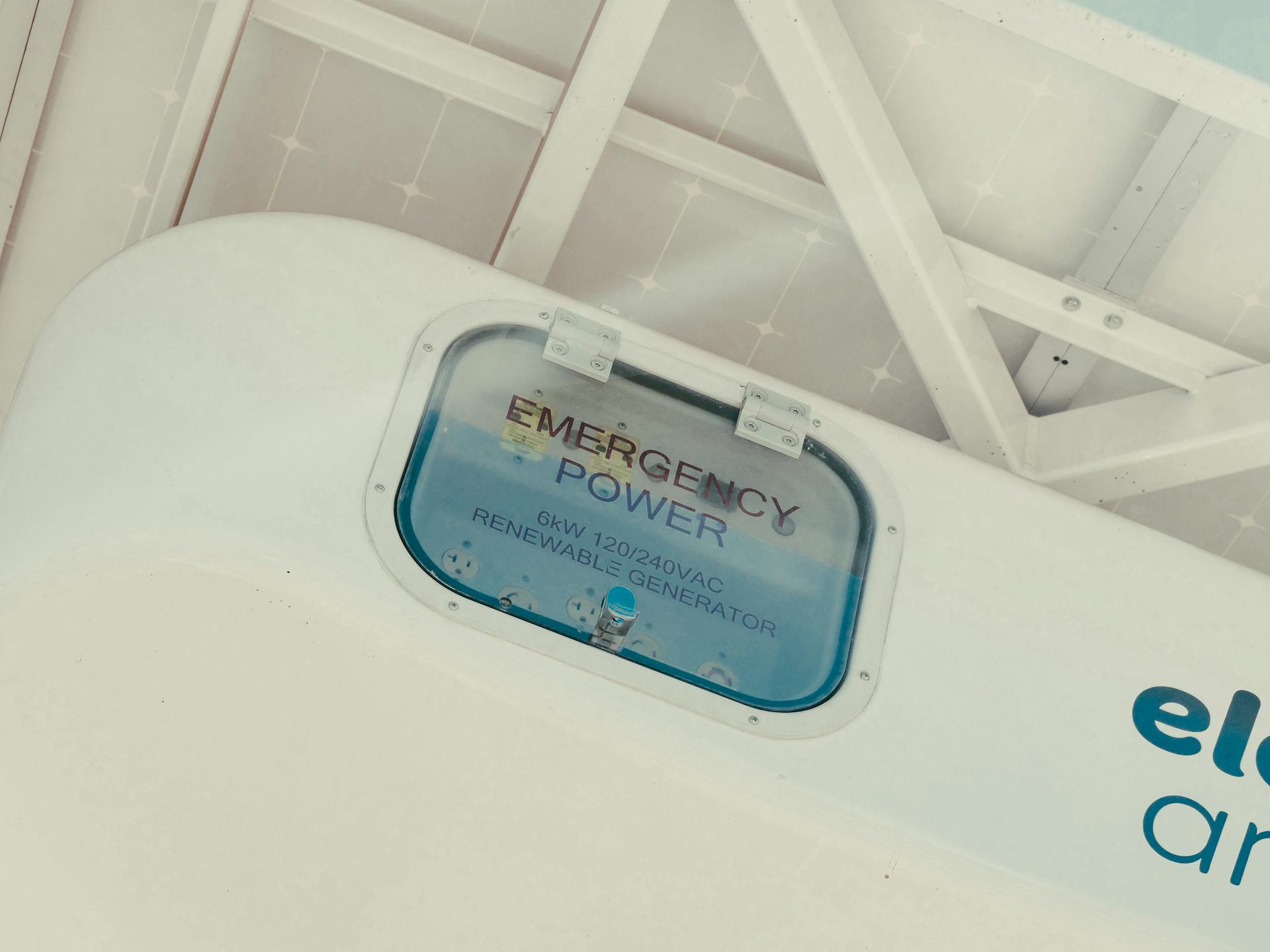
Noise Level is an important consideration when choosing a generator. Inverters are significantly quieter than traditional generators, producing noise levels between 50-60 decibels, while traditional generators can produce noise levels of up to 80 decibels or higher.
Inverters have advanced technology that allows them to run at a lower noise level, making them better suited for use in residential areas, camping, and other off-grid activities where noise pollution is a concern. This reduced noise level is a big advantage for those who want to enjoy the outdoors without disturbing others.
Inverters are ideal for use in residential areas, camping, and other outdoor activities where noise pollution may be a concern. They're perfect for those who want to relax in peace without the constant roar of a gas-powered engine.
Here's a comparison of noise levels between inverters and traditional generators:
Safety and Portability
Inverter generators are not inherently safer than other portable generators, but many models feature a built-in sensor that triggers an automatic shutoff if carbon monoxide builds up to dangerous levels.
You should never run an inverter generator in an enclosed space, and it's essential to run it at least 20 feet from your home with the exhaust port pointing away from your dwelling.
To ensure the safety of the people in your home, choose a recommended model from a reputable source that has passed rigorous safety tests, such as those conducted by CR.
Inverter generators are generally smaller and lighter than traditional generators, making them more portable and easy to store, which is a great advantage for camping, RVing, and other outdoor activities.
Their compact size and lightweight design also make them easier to handle and transport, which is a big plus for people who need to move them around frequently.
Readers also liked: Home Steam Engine Generator
Portable Generators vs. Others: Safety
Carbon monoxide (CO) poisoning is a serious risk with all portable generators that aren’t used properly. Inverter generators are no different and should only be used outside in an unenclosed area, at least 20 feet from your home, with the exhaust port pointing away from your dwelling.
Discover more: Can a Ac Motor Be Used as a Generator
Many new portable generators feature a built-in sensor that triggers an automatic shutoff if CO builds up to dangerous levels in an enclosed space. This safety feature is now a requirement for CR's inverter generator ratings.
You can't rely on inverter generators being inherently safer than other portable generators. In fact, virtually all inverter generators in CR's ratings have automatic CO shutoff, which is a crucial safety feature.
To run an inverter generator safely, never run it in an enclosed space. You should also run it at least 20 feet from your home and direct exhaust away from your home.
Some inverter generators, like Honda's EU3200i, have an engine that emits less CO in the first place. However, this doesn't mean you can be complacent about safety precautions.
Portability
Portability is a major advantage of inverters compared to traditional generators. They are usually smaller and lighter, making them more portable and easy to store.
This makes them a solid choice for camping, RVing, and other outdoor activities where space is limited. I've seen friends use portable generators for camping trips and they're a game-changer.
The EU series of generators, released in 1998, aimed to achieve compactness and lightness while maintaining excellent electric performance. They achieved their goals with a completely new design and numerous technologies.
The 13kg EU9i became the standard for Honda's inverter generators, demonstrating the success of their design. This level of portability is a significant improvement over traditional generators.
Maintenance and Performance
Inverter generators require less maintenance than traditional generators, thanks to their advanced technology and fewer moving parts.
They also come with built-in features like automatic shut-off, which helps prevent damage and prolongs the generator's life.
This means you'll spend less time worrying about maintenance and more time enjoying the great outdoors.
Traditional generators, on the other hand, need regular maintenance like oil changes, air filter replacement, and spark plug replacement.
Inverters are also more portable than traditional gas-powered generators, weighing less and taking up less space, making them perfect for camping, RVing, and other off-grid activities.
This portability also means you can store them more easily, reducing the hassle of fuel storage.
For another approach, see: How to Run Ac off Generator
Maintenance
Inverter generators require less maintenance than traditional generators. This is due to their smaller capacity, fewer moving parts, and advanced technology.
Regular maintenance is a must for traditional generators, which need oil changes, air filter replacement, and spark plug replacement.
Inverters have built-in features such as automatic shut-off, which helps prevent damage and prolongs their life.
Traditional generators burn through fuel more rapidly, making it a challenge to store sufficient fuel for off-grid needs.
Inverters are more portable than traditional gas-powered generators due to their smaller size and lighter weight.
Worth a look: Duromax Tri Fuel Inverter Generator
High Efficiency Cooling
The cooling system of your generator is a crucial aspect of its performance and longevity. The inverter, alternator, engine, and muffler are positioned in ascending order of heat dissipation and temperature.
This clever design enables the engine and alternator to share a cooling fan, reducing unit size and weight.
For another approach, see: Another Name for an Ac Generator Is the Alternator
Comparison and Options
Choosing between an inverter generator and a traditional generator depends on your specific needs and intended use. If you need a heavy-duty machine and are okay with added noise and maintenance, a conventional generator might be the better option.
For portable and quiet electricity solutions, such as camping or RVing, an inverter generator is the way to go. They're perfect for off-grid activities where a traditional generator might be too cumbersome.
If you're planning for hurricane preparedness, consider what items you need for your emergency kit, such as a portable generator that can provide power during a blackout.
Parallel Compatibility
Parallel compatibility is a feature that allows you to connect two or more inverters together to increase power output.
This is especially helpful for applications where you're powering high-wattage appliances and multiple devices simultaneously, such as large homes or commercial spaces.
Connecting multiple inverters can significantly boost your power output, making it a great option for those with high energy demands.
Increased power output can also provide a backup power source during outages, ensuring that your essential appliances stay running.
The Stable-Frequency Ex300
The Stable-Frequency Ex300 was a game-changer in the world of generators, released by Honda in 1987. It was the first generator to be equipped with an inverter circuit, which significantly improved generation efficiency.
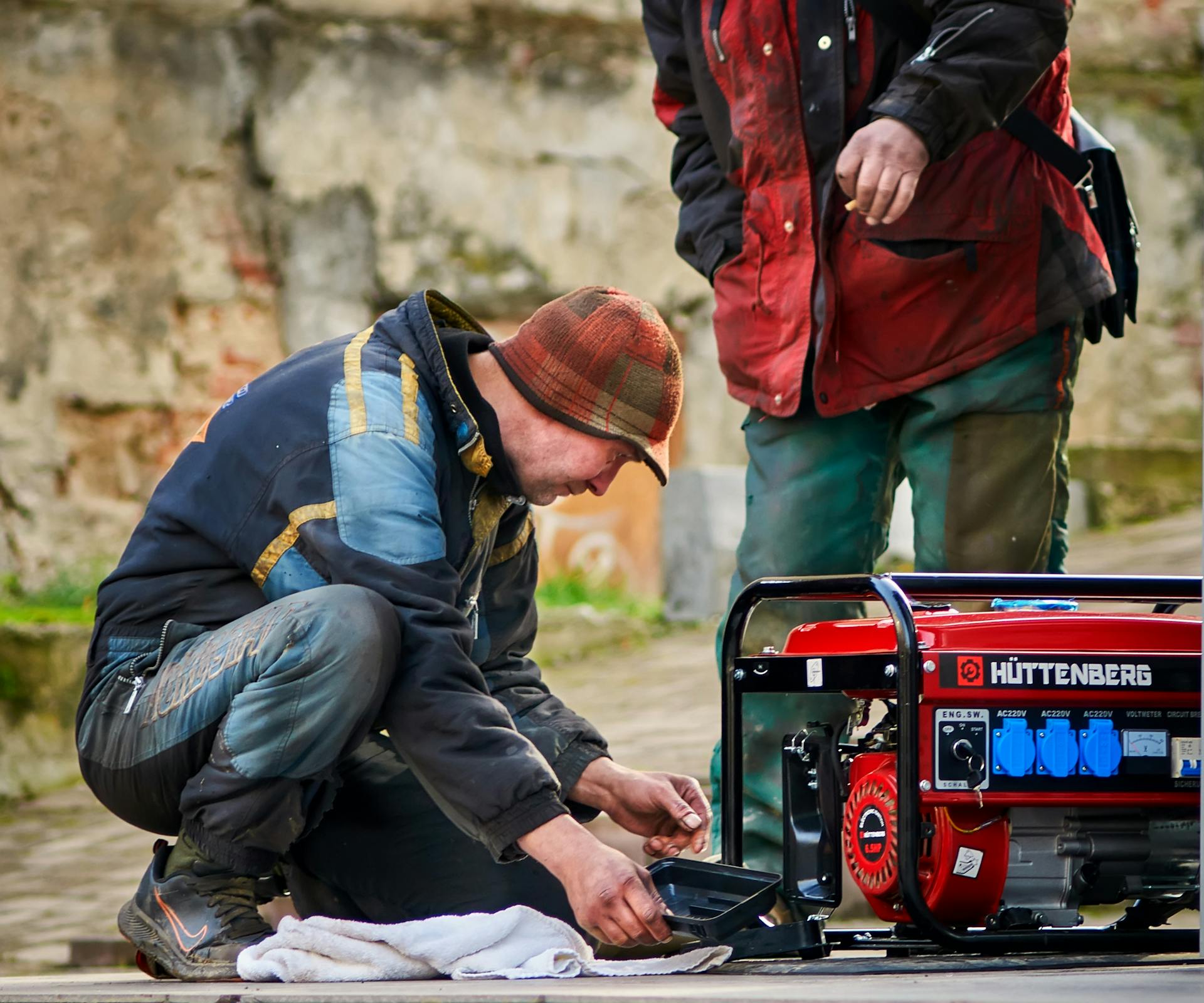
This innovative system employed a "3-phase multi-pole high-speed generation system" that spun a rotor at high speeds to generate a 3-phase alternating current. The result was a more efficient and user-friendly generator.
The EX300's inverter circuit enabled electricity generation by increasing generating efficiency and creating a direct current through a rectifier circuit. This technology also allowed for the maintenance of a stable frequency alternating current.
One of the limitations of the EX300 was its inability to power all appliances, due to the rectangular waveform it generated.
Take a look at this: Direct Current Electric Generator
Product Features and Specifications
An inverter generator is a type of portable power generator that converts DC power from a gasoline engine or fuel source into AC power that's safe for use with sensitive electronics.
Inverter generators are designed to be quieter and more fuel-efficient than traditional generators, with some models producing as little as 50 decibels of noise and using up to 30% less fuel.
Check this out: Inverter Dual Fuel Generator
They often feature multiple outlets, such as a 120V 20A household outlet, a 120V 30A twist-lock outlet, and a 12V DC outlet, making it easy to power a variety of devices.
Some inverter generators also come with advanced features like remote start, electric start, and USB ports, which can be a convenient bonus for outdoor enthusiasts and RV owners.
Consider reading: Ac Soft Start for Generator
Microprocessor-Controlled Unit
Honda's microprocessor-controlled unit is a game-changer for portable generators. It allows for accurate and high-speed control, making their generators more compact and appealing to a wider range of customers.
The inverter unit, a crucial part of this system, rectifies high frequency alternating current from the alternator and outputs low-distortion sine-wave alternating current. This ensures a stable frequency output, making it possible to power delicate electrical appliances like personal computers.
By equipping its generators with microprocessors, Honda's generators can control the engine's load-linked rotation-controlling electronic governor. This results in more efficient and reliable performance.
Explore further: Honda Eu2000i Inverter Generator Manual
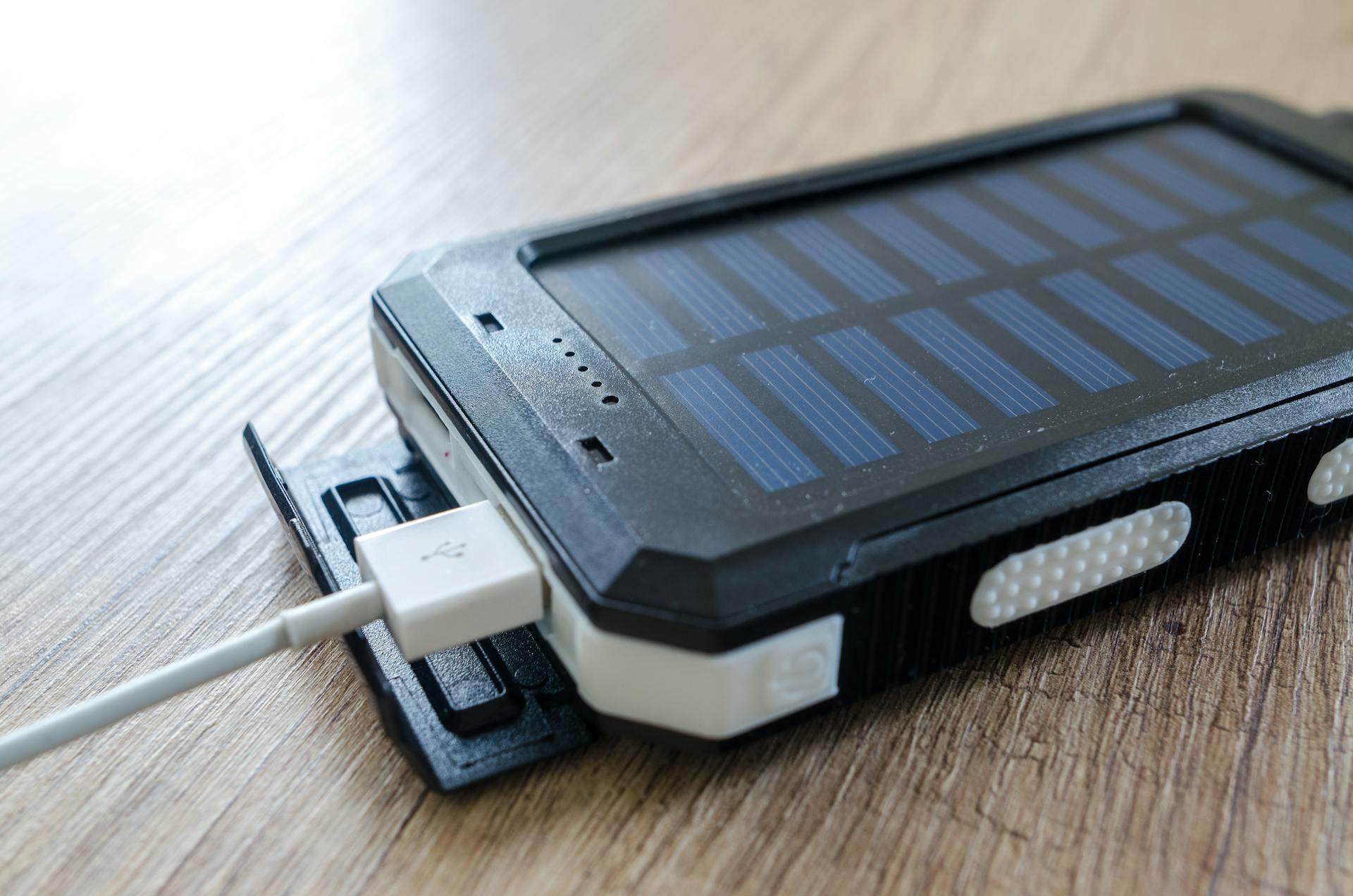
Honda's pursuit of inverter technology was driven by the need to evolve the quality of electricity supplied from its portable generators. The goal was to provide a stable and reliable power source, free from the fluctuations that plagued earlier models.
The EX500, released in 1996, was a significant step towards achieving this goal. It realized sine-wave generation equivalent to mains power, thanks to the use of purpose-built ICs.
Size
Inverters are incredibly compact, making them perfect for outdoor activities like camping or RVing where space is limited.
They can be as small as a shoebox, easily carried by one person, and are a far cry from the bulkier traditional generators.
In fact, inverters can also be larger if you need more power, giving you flexibility in your setup.
Traditional generators, on the other hand, are usually much bulkier in comparison to inverters.
Fuel Type
The fuel type of this product is a crucial aspect to consider. It's a gasoline-powered engine, which is suitable for most driving conditions.
This engine is capable of producing 200 horsepower, making it a great option for those who need a little extra power.
Product Examples and Reviews
Let's take a look at some product examples and reviews to get a better understanding of what an inverter generator is and how it works. Westinghouse's WGen7500 is a popular model that produces 7500 watts of power and features a 420cc engine.
Inverter generators are designed to be quiet and fuel-efficient, as seen in the WGen7500's 74 dBA noise level and 16-hour run time on a single tank of gas. They're perfect for camping trips or tailgating parties.
The WGen7500 also features four 120V 20A GFCI outlets and one 120/240V 30A twist lock outlet, making it easy to power multiple devices at once.
Top-Rated
The top-rated inverter generators are designed with safety in mind, featuring carbon monoxide-sensing technology that stops the engine if CO levels reach certain limits in an enclosed space.
These generators received a midlevel to top-level score in our CO-safety test, which is a testament to their reliability and effectiveness.

Each of these inverter generators earns high ratings in its size category, making them suitable for a variety of applications.
They also excel in power delivery and power quality, making them a great choice for those who need a reliable source of electricity on the go.
These generators are available in a range of sizes, from large to mini, so you can choose the one that best fits your needs.
Predator 8750 with CO Secure
The Predator 8750 with CO Secure is a reliable option for those in need of a powerful inverter generator. It's part of the best inverter generators of 2024, known for being quiet and efficient.
This generator is a great alternative to traditional portable generators, which can be noisy and less efficient. The Best Inverter Generators of 2024 Are Quiet, Efficient, and, Yes, a Little Expensive article highlights the benefits of inverter generators like the Predator 8750.
In terms of safety, the Predator 8750 with CO Secure has a built-in carbon monoxide detector, which is a must-have feature for any generator. Why a Portable Generator Needs a Transfer Switch to Safely Power Your Whole House emphasizes the importance of safety features when using a portable generator.
For those who want to power their whole house, a transfer switch is necessary to safely connect the generator to the electrical system. The Predator 8750 with CO Secure can handle this task, making it a great option for those who need a reliable and safe generator.
If this caught your attention, see: What Size Inverter Generator Do I Need
Frequently Asked Questions
Will an inverter generator run a refrigerator?
Yes, an inverter generator can run a refrigerator, but it's essential to choose one that produces clean, sine-wave power to prevent damage to the fridge's sensors and control panels.
Which is better, a generator or an inverter?
For small-scale applications and sensitive electronics, inverters are a quieter and more suitable choice. For larger power needs and remote locations, generators are a more reliable option.
What is the difference between a generator and an inverter generator?
Inverter generators outperform traditional generators in terms of noise, fuel efficiency, and power quality, making them a better choice for sensitive electronics and medical devices
What will a 2000 watt inverter generator run?
A 2000-watt inverter generator can power small appliances, lights, fans, and some power tools, but check the specific wattage requirements of each device to ensure safe operation.
Sources
- https://www.homedepot.com/b/Outdoors-Outdoor-Power-Equipment-Generators-Inverter-Generators/N-5yc1vZcbpx
- https://www.consumerreports.org/home-garden/generators/pros-and-cons-of-inverter-generators-a1104840654/
- https://blog.ecoflow.com/us/inverter-vs-traditional-generator/
- https://global.honda/en/tech/Generators_Sine-wave_inverter_control_system/
- https://www.anker.com/blogs/home-power-backup/what-is-an-inverter-generator-working-rule-pros-and-cons
Featured Images: pexels.com
